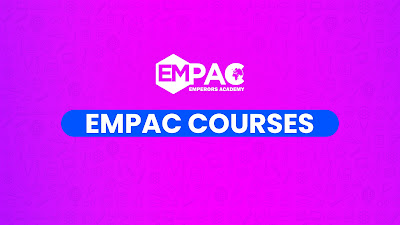CLICK HERE AND APPLY FOR ADMISSION
Are you seeking a pathway to unleash your artistic flair? Want to master the intricacies of visual storytelling? Look no further than the graphic design course at EMPAC!
A Comprehensive Dive
into Graphic Design
At EMPAC,
we understand the evolving dynamics of today's design world. We live in an era
where visual representation holds unprecedented power, shaping perceptions and
driving decisions. This is why our graphic design course isn't just another
academic endeavor—it's a journey from understanding the essence of design to
mastering the tools that bring concepts to life.
Beginning with the
Basics
Ever felt
overwhelmed diving into a new field? Worry not! At EMPAC, we believe in
building a strong foundation. Our course is meticulously designed to guide
students from the very basics. Whether you're someone who's never opened a
design software or you're just looking to revisit fundamental concepts, we've
got you covered.
Progressing to Advanced
Mastery
One of
EMPAC's unique strengths lies in its forward-thinking curriculum. As you gain
confidence in the basic concepts, the course evolves, introducing you to the
complexities of contemporary design. From advanced software techniques to
intricate design philosophies, EMPAC ensures you're always on the cutting edge.
Why Choose EMPAC?
- Experienced Faculty: Our team comprises
seasoned professionals who bring real-world experience to the classroom,
ensuring you gain both theoretical knowledge and practical insights.
- State-of-the-Art Resources: From high-end software
to an expansive digital library, students have access to top-notch
resources, facilitating an enriched learning experience.
- Community & Networking: Enrolling at EMPAC
isn't just about attending a course; it's about becoming a part of a
vibrant community. The connections you make here could be the springboard
for your future career.
- Career Guidance: Beyond just teaching,
we mentor. Our dedicated career services team is committed to guiding
students through portfolio development, internship placements, and
potential job opportunities.
A Bright Future in
Graphic Design Awaits
The
digital era beckons, and the need for skilled graphic designers is more
pressing than ever. From branding to entertainment and from tech to advertising,
every industry is on the lookout for design visionaries. With the comprehensive
training from EMPAC, you won't just be answering this call—you'll be leading
the charge.
Conclusion
Embarking on a journey in graphic design at EMPAC promises more than just skill acquisition—it's about molding your future, refining your vision, and elevating your potential. Let your creativity find its true north. Dive deep, explore, and let each design tell its tale. For those keen on understanding the depth of our curriculum, look no further.
CLICK HERE AND APPLY FOR ADMISSION
The detailed curriculum is provided below.
Graphic Design
Curriculum using Photoshop
I. Introduction to
Graphic Design, Art, and Visual Communication
1.
History and Evolution of Graphic Design
2.
The Role of Art in Communication
3.
Basic Visual Literacy
II. Graphic Design
Principles
1.
Elements of Design:
·
Line
·
Shape
·
Form
·
Color
·
Texture
·
Space
·
Value
2.
Principles of Design:
·
Balance
·
Contrast
·
Emphasis
·
Movement
·
Pattern
·
Rhythm
·
Unity
III. The Science and
Psychology of Colors
1.
Introduction to
Color Theory
·
Basics of the Color Wheel: Primary, Secondary, Tertiary Colors
·
Warm vs. Cool Colors
2.
Color Psychology
and Emotional Impact
·
How Colors Evoke Feelings and Moods
·
Cultural and Societal Associations with Colors
3.
Color Combinations
and Harmony
·
Complementary
·
Analogous
·
Triadic
·
Split-Complementary
·
Creating Mood with Color Combinations
4.
Colors in Branding
·
The Importance of Consistency in Brand Colors
·
Case Studies: Successful Brand Colors and their Psychological Impact
5.
Color Accessibility
·
Importance of Color Contrast
·
Designing for Color Blindness and Other Visual Impairments
6.
Colors in Digital
vs. Print
·
RGB vs. CMYK: Differences and Best Practices
·
Screen Calibrations and its Impact on Color Display
7.
Strategic Use of
Colors in Marketing and Advertising
·
Influencing Purchases and Perceptions
·
Colors in Call-to-Actions and Conversion Optimization
IV. Introduction to
Photoshop
1.
Introduction to Adobe Photoshop
2.
Navigating the Photoshop Workspace
3.
Understanding the Photoshop Interface
V. Typography and Its
Role in Design
1.
History of Typography
2.
Anatomy of Type
3.
Font Categories
4.
Type Pairing
5.
Readability vs. Legibility
6.
Designing with Text in Photoshop
VI. Visual Storytelling
and Narratives
1.
The Role of Imagery in Storytelling
2.
Sequential Design: Storyboards & Comics
3.
Iconography and Symbolism in Design
VII. Graphic Design
Principles in Photoshop
1.
Fundamentals of Photoshop
·
Basic Tools & Their Functions
·
Working with Layers
·
Working with Colors
·
Resizing and Cropping Images
·
Understanding Resolution & Image Size
2.
Basic Image Manipulation
·
Retouching Techniques
·
Adjustment Layers
·
Filters & Effects Basics
3.
Text and Typography in Photoshop
·
Adding Text to Images
·
Formatting and Styling Text
·
Working with Type Layers
VIII. Advanced Image
Manipulation in Photoshop
1.
Masks & Channels
2.
Advanced Retouching & Restoration
3.
Smart Objects & Smart Filters
4.
Advanced Compositing Techniques
IX. Digital Illustration
in Photoshop
1.
Using Pen Tool for Illustrations
2.
Vector vs. Raster in Photoshop
3.
Advanced Brush Techniques
X. 3D Elements in Photoshop
1.
Introduction to 3D Layer
2.
Creating 3D Objects
3.
Rendering and Lighting in 3D
XI. Real-world
Applications & Special Effects in Photoshop
1.
Poster Design
2.
Web & App Design Basics
3.
Photo to Art (E.g., Turning Photos into Watercolor or Sketch)
4.
Cinemagraph Creation
XII. Advanced Photoshop
Techniques
1.
Automation: Actions & Batch Processing
2.
Advanced Color Correction Techniques
3.
Panoramic Photo Merging
4.
HDR Imaging
XIII. User Experience
(UX) & User Interface (UI) Design Basics
1.
Introduction to UX/UI Principles
2.
Role of Graphic Design in User Experience
3.
Wireframing and Prototyping in Photoshop
XIV. Contextual
Understanding in Graphic Design
1.
Socio-cultural Influences on Design
2.
Ethical Implications in Graphic Design
3.
Audience and Target Market Analysis
XV. Branding and
Identity in Photoshop
1.
Branding Basics: Logo, Typography, Colors, Imagery
2.
Designing for Different Media: Print, Digital, Environmental
3.
Brand Consistency and Style Guides
XVI. Preparing for a
Graphic Design Career
1.
Building a Portfolio
2.
Working with Clients: Communication, Briefs, Feedback
3.
Industry Trends and Staying Updated
XVII. Output, Export
& Post-production in Photoshop
1.
Preparing Files for Print
2.
Exporting for Web & Digital Media
3.
Asset Generation for UI Design






0 Comments